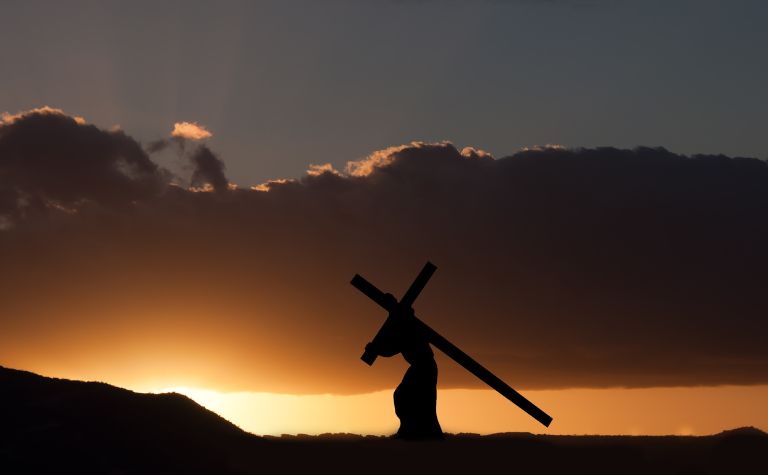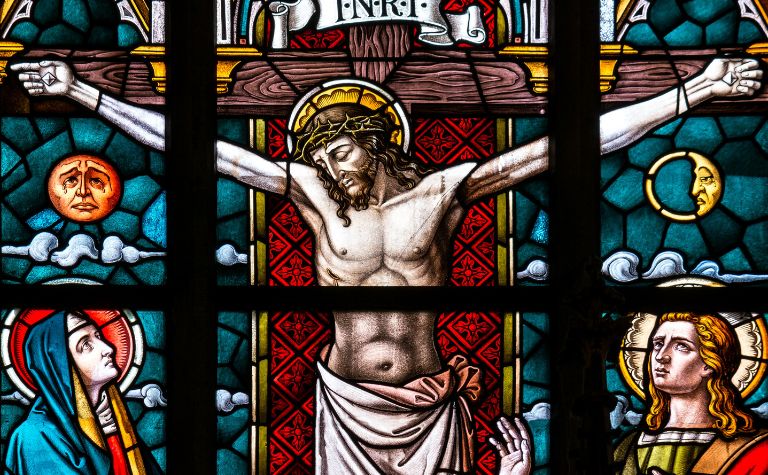How did Jesus Christ view money and possessions? How did he view the rich and the poor? Not only are many people interested to know what Jesus taught about wealth and poverty, but they are curious to know how he lived. Did he preach generosity and minimalism, but practice materialism and greed?
Jesus was poor according to the economic standards within the first-century Roman Empire. He was born to parents in poverty and didn’t have a home as an adult. Jesus’ teaching promoted caring for those who lacked basic necessities, and he taught his followers not to prioritize earthly possessions.
What evidence exists that Jesus was a part of the poorest segment of Roman society? What do the Gospels say about Joseph and Mary’s economic status? How do scholars know that Jesus didn’t own a house? Keep reading to learn the answers to these questions and others.
Also see Why Did Jesus Turn Water Into Wine? to learn more.

Jesus chose a life of poverty
At a time when wealth was measured in large part by material possessions, Jesus taught his followers not to hoard earthly goods. “Do not lay up for yourselves treasures on earth,” he said, “where moth and rust destroy and where thieves break in and steal, but lay up for yourselves treasures in heaven, where neither moth nor rust destroys and where thieves do not break in and steal” (Matt. 6:19-20).
One reason Jesus chose a life of poverty was because it taught people what’s most important in life, which is living for God. He didn’t teach that material items were evil, but a threat to successfully adopting Godly values, ambitions, and a sense of security.
One Bible scholar writes, “Jesus demonstrated his own devotion to the will of God by refusing to lay up material wealth for Himself (cf. Luke 9:58). He was the King of kings, yet he lived like a pauper in His own world.” [1]
Jesus was among the poorest people in the Roman Empire
The table below reveals the economic classes of those who lived at the time of the Roman Empire, according to a 2009 study in The Journal of Roman Studies. [2]
The key measures of sustainability were the minimum amount of food, shelter, and clothing necessary to support life. The poorest people in the empire worked daily to acquire the basic necessities of life.
The study reveals that approximately 10% of the population in the Roman Empire lived at a level above what was required to sustain life. About 62% lived at the level of being able to acquire the basic necessities. Lastly, about 28% lived below that level. Jesus was among those at the lowest level.
| Tier | Percentage of Population | People |
|---|---|---|
| Tier 1 Wealthiest | .04% | Imperial dynasty, senators’ families, royalty |
| Tier 2 | 1% | Provincial officials, some military officers |
| Tier 3 | 1.76%? | Wealthy non-politicians, some veterans, some merchants |
| Tier 4 | 7%? | Some merchants, traders, artisans, veterans |
| Tier 5 | 22%? | Many merchants and traders, some farm families; near the minimum level to sustain life |
| Tier 6 | 40% | Small farm families, laborers, most merchants and traders; at the minimum level to sustain life |
| Tier 7 Poorest | 28% | Many farm families, widows, orphans, beggars, disabled, prisoners; below the minimum level to sustain life |
The New Testament is clear that Jesus and the church he started valued the poorest in society, like widows (e.g. Acts 6:1), orphans (e.g. Jas. 1:27), the disabled (e.g. John 5:3), beggars (e.g. Acts 3:10), prisoners (e.g. Matt. 25:44), and those lacking food and clothing (e.g. Matt. 25:35-36).
Jesus identified so closely with the poorest people that he said if his followers rejected them then they were ultimately rejecting him: “I tell you the truth, when you refused to help the least of these my brothers and sisters, you were refusing to help me” (Matt. 25:45, NLT).
Also see Who Wiped Jesus Christ’s Face? to learn more.

Jesus was born poor
Joseph and Mary weren’t wealthy people. They were among the poorest people in Roman society. One reason scholars know this is because Luke’s Gospel records that they offered “a sacrifice according to what is said in the Law of the Lord, a pair of turtledoves, or two young pigeons” (Luke 2:24; Lev. 1:14; 5:11).
New Testament scholar James Edwards explains, “This offering, which was prescribed for Israelites of humble means and thus identifies Mary and Joseph with the lower economic classes in Palestine, was prescribed for the purification of a birth mother.” [4]
Scholar Walter Liefeld adds, “The offering of birds instead of a lamb shows that [Jesus] was born into a poor family. Perhaps this helped him identify with the poor of the land (cf. 6:20).” [5]
Some scholars speculate that Jesus may have inherited a few possessions from Joseph when he died. However, the Gospels don’t mention Joseph’s death or any inheritance.
Jesus didn’t have a home
In one memorable teaching, Jesus reflected on the fact that animals had a place to call home in this world, but he didn’t.
He made the comparison to his disciples: “Foxes have holes, and birds of the air have nests, but the Son of Man has nowhere to lay his head” (Luke 9:58, ESV). Jesus lacked permanent shelter, one of the basic necessities that all people need.
New Testament scholar Darrell Bock writes, “Jesus describes what disciples can expect when he is their example. His situation is worse than that of the beasts: foxes have holes and birds have places to stay, but the Son of Man has no home… Homelessness has been Jesus’ fate from his birth.” [1]
Jesus’ rejection of worldly riches enabled him to identify with those who were in need. He called his followers to a similar lifestyle.
Also see Was Jesus Christ A Martyr? to learn more.

Did Jesus own any possessions?
There are a few instances in the Gospels that mention an item of clothing that Jesus wore and a coin that he once had. Some readers also point out that Jesus called people of all economic classes to follow him.
- The Gospel of John mentions that Jesus wore a tunic (John 19:23)
- Other scholars point out that Jesus had money to pay the temple tax (Matt. 17:24-25)
- Some of the people Jesus called had servants (e.g. Mark 1:20)
- Jesus had wealthy friends (John 12:1-3)
“Material possessions tend to focus one’s thoughts and interests on the world only. Wealth gradually enslaves those who are attached to it and perverts their values. The more we have, the easier it is to be possessed by our possessions, comforts, and recreations.” – Kent Hughes
7 more New Testament verses about money and possessions
- Luke 6:20, “And he lifted up his eyes on his disciples, and said: Blessed are you who are poor, for yours is the kingdom of God.”
- 1 John 3:17, “But if anyone has the world’s goods and sees his brother in need, yet closes his heart against him, how does God’s love abide in him?”
- James 2:5, “Listen, my beloved brothers, has not God chosen those who are poor in the world to be rich in faith and heirs of the kingdom, which he has promised to those who love him?”
- Luke 1:53, “He has filled the hungry with good things, and the rich he has sent away empty.”
- Galatians 2:10, “Only, they asked us to remember the poor, the very thing I was eager to do.”
- Ephesians 4:28, “Let the thief no longer steal, but rather let him labor, doing honest work with his own hands, so that he may have something to share with anyone in need.”
- Luke 12:32-34, “Fear not, little flock, for it is your Father’s good pleasure to give you the kingdom. Sell your possessions, and give to the needy. Provide yourselves with moneybags that do not grow old, with a treasure in the heavens that does not fail, where no thief approaches and no moth destroys. For where your treasure is, there will your heart be also.”
“I value all things only by the price they shall gain in eternity.” – John Wesley
Also see What Time Did Jesus Die? to learn more.
References:
[1] Manners and Customs of the Bible, p. 338.
[2] Luke 9:51-24:53 by Darrell Bock. BECNT. p. 978.
[3] Source
[4] The Gospel According to Luke by James R. Edwards. PNTC. p. 82.
[5] Luke by Walter Liefeld. EBC. p. 849.
Related Articles
The crucifixion of Jesus of Nazareth is one of the most pivotal moments in world history. The death of a poor Jewish carpenter during the days of the Roman Empire wouldn't ordinarily have garnered...
The crucifixion of Jesus Christ is one of the most important events in the Bible. Jesus' death on the cross, as well as his resurrection from the dead, are the climactic moments in the New Testament...
